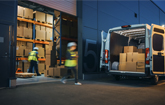DUBLIN, Sept. 6, 2022 /PRNewswire/ -- The "Logistics Automation Market By Component, By Application, By Organization Size, By End-Use Industry: Global Opportunity Analysis and Industry Forecast, 2020-2030" report has been added to ResearchAndMarkets.com's offering.
Logistics automation market was valued at $49.7 billion in 2020, and is estimated to reach $147.4 billion by 2030, growing at a CAGR of 11.9% from 2021 to 2030.
North America is expected to dominate the global logistics automation market owing to growth in e-commerce and adoption of automation solutions as a result of labor shortages in the region. Moreover, adoption of robots in the region has been observed, which is expected to create demand for automation solutions and in turn is anticipated to contribute in the growth of the market.
For instance, in August 2021, Yandex Self-Driving Group partnered with Grubhub to operate delivery robots on college campuses in the U.S. Moreover, in 2020, Hyundai Motor Group acquired controlling interest in Boston Dynamics with the aim of advancing robotics and mobility.
Labor shortages are currently being faced across the globe, which in turn is creating the demand for warehouse automation. Moreover, companies in emerging countries such as China and India, are also adopting automation in warehouse to get ahead of labor shortage.
For instance, in 2022, Cainiao Network Technology built the largest unmanned warehouse in Southeast Asia for Thai courier Flash Express. This unmanned warehouse can process 6,000 parcels a day and this can rise to 20,000 a day during peak season. Henceforth, greater demand for warehouse automation from emerging countries is the factor that will be creating new growth opportunities for logistics automation market during the forecast period.
Based on organization size, the global logistics automation market is segregated into SME, and large enterprises. Large enterprises are utilizing automated material handling technology for several processes such as categorization and moving heavy items, or containers within warehouse. In addition, autonomous mobile robots are also being utilized to move materials from picking area to order packing area within the warehouse.
For instance, in January 2022, DHL supply chain announced15 million investment in robotics solutions from Boston Dynamics to further automate warehousing in North America. Boston Dynamics will equip DHL facilities with 'Stretch", which is a robot designed to automate unloading process in distribution centers.
The significant factors impacting the growth of the logistics automation market comprise improved efficiency & workforce safety, growth in e-commerce, adoption of industry 4.0 technologies, and advancements in robotics technologies. Moreover, factors such as high initial investment, are expected to be hampering the market growth.
Furthermore, adoption of autonomous vehicles & drones, and greater demand for warehouse automation from emerging economies are expected to create new growth opportunities for the logistics automation market during the forecast period.
COVID-19 Impact Analysis
The COVID-19 crisis has created uncertainty in the market, and led to massive slowing of supply chain, falling business confidence, and increasing panic among the customers. Governments of different regions have announced total lockdown and temporary shutdown of industries, thereby adversely affecting the overall production and sales.
The impact of the COVID-19 pandemic has resulted in workforce changes, temporary restriction on movement of goods, and adoption of automation solutions. The pandemic has resulted in supply-chain disruptions causing temporary restriction on movement of goods. In 2019, online shopping rose by 20% and then by 30% during lockdown.
Rise in online sales compelled companies to restructure their warehouse to manage e-commerce logistics. At the same time, companies have also had to safeguard the health & safety of their employees working along the entire supply chain. In order to fulfill e-commerce demand, and adapt to new situation, several logistics companies introduced changes in their workforces, and opted for logistics automation.
However, with the removal of lockdown restrictions, several logistics companies have started to invest in industry 4.0 technologies in order to deal with labor shortages issue, and to fulfill rising demand from the e-commerce sector. Companies are adopting autonomous robots for automating the tasks within warehouse, and drones for last-mile delivery.
Key Market Players
- Beumer Group GmbH & Co. KG
- Daifuku Co., Ltd.
- Honeywell International Inc.
- Jungheinrich AG
- Kion Group AG
- Knapp AG
- Mecalux, S.A.
- Murata Machinery, Ltd.
- SSI Schaefer Group
- TGW Logistics Group GmbH
Key Market Segments
By Organization Size
- Small and Medium Enterprises
- Large Enterprises
By End-Use Industry
- Manufacturing
- Healthcare and Pharmaceuticals
- Fast-Moving Consumer Goods
- Retail and E-commerce
- Automotive
- Others
By Component
- Hardware
- Software
- Services
By Application
- Warehouse and Storage Management
- Transportation Management
By Region
- North America
- U.S.
- Canada
- Mexico
- Europe
- Germany
- United Kingdom
- France
- Italy
- Rest of Europe
- Asia-Pacific
- China
- Japan
- India
- South Korea
- Rest Of Asia Pacific
- LAMEA
- Latin America
- Middle East
- Africa
For more information about this report visit https://www.researchandmarkets.com/r/wb0t1z
Media Contact:
Research and Markets
Laura Wood, Senior Manager
[email protected]
For E.S.T Office Hours Call +1-917-300-0470
For U.S./CAN Toll Free Call +1-800-526-8630
For GMT Office Hours Call +353-1-416-8900
U.S. Fax: 646-607-1907
Fax (outside U.S.): +353-1-481-1716
Logo: https://mma.prnewswire.com/media/539438/Research_and_Markets_Logo.jpg
SOURCE Research and Markets

WANT YOUR COMPANY'S NEWS FEATURED ON PRNEWSWIRE.COM?
Newsrooms &
Influencers
Digital Media
Outlets
Journalists
Opted In




Share this article